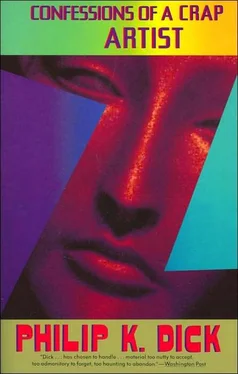The long walks had begun in junior high school, back in the ‘thirties, before World War Two. We were living on a street named Garibaldi Street, and during the Spanish Civil War because of the feeling against the Italians the street name was changed to Cervantes Street. Jack soon got the notion that all the street names were going to be changed and for a while he seemed to be living among the new names—all ancient writers and poets, no doubt—but when no other street names were changed that mood passed. Anyhow it had made the world situation seem real to him for a month or so, and we thought of that as an improvement; up to then he had seemed unable to imagine either the war as an actual event or, for that matter, the real world itself in which that war was taking place. He had never been able to distinguish between what he read and what he actually experienced. To him, vividness was the criterion, and those nauseating accounts in the Sunday supplements about lost continents and jungle goddesses had always been more compelling and convincing than the daily headlines.
“Are you still working?” Charley said from behind him.
“Of course he is,” I said.
But Jack said, “I temporarily gave up my job at the tire place.”
“Why?” I demanded.
“I’m too busy,” Jack said.
“Doing what?”
He pointed to a pile of notebooks, filled, I could see, with pages of his writing. At one time he had spent his spare time writing letters to the newspapers, and here, once more, he was involved in some long. winded crank project, probably elaborating some scheme for irrigating the Sahara Desert. Picking up the first notebook, Charley thumbed through it and then tossed it down. “It’s a diary,” he said.
“No,” Jack said, arising. His thin, knobby face got that cold, superior look, that travesty of the hauteur of the scholar who faces the layman. “It’s a scientific account of proven facts,” he said.
I said, “How are you supporting yourself’?” I knew instinctively how he was supporting himself; he was once again depending on handouts from home, from our parents—who, at this late point in their lives, couldn’t afford to support anyone, scarcely themselves.
“I’m okay,” Jack said. But of course he would say that; as soon as money came in he spent it, usually for flashy clothes, or else lost it or lent it or invested it in some madness he heard about in a pulp magazine: giant mushrooms, perhaps, or skin-healing salve to be peddled from door to door. At least the tire job, although bordering on the crooked, had been steady.
“How much money do you have?” I demanded, keeping after him.
“I’ll see,” he said. He opened a dresser drawer. From it he took a cigar box. He sat down on the bed, again on the sheets, and, placing the cigar box on his lap, opened it. The cigar box was empty except for a few dozen pennies and three nickels.
“Are you trying to get another job?” I asked.
“Yes,” he said.
In the past he had held the dregs ofjobs: he had helped deliver washing machines for an appliance store; he had uncrated vegetables for a grocery store; he had swept out a drug store; once he had even given out tools at the Alameda Naval Air Station. During the summer he had now and then hired himself out as a fruit picker and gotten carried, by open truck, miles out into the country; that was his favorite job because he got to stuff himself with fruit. And in the fall he invariably walked to the Heinz cannery near San Jose and filled cans with bartlett pears.
“You know what you are?” I said. “You’re the most ignorant, inept individual on the face of the globe. In my entire life I’ve never seen anyone with such rubbish in their head. How do you manage to stay alive at all? How the hell did you get born into my family? There never were any nuts before you.”
“Take it easy,” Charley said.
“It’s true,” I said to him. “Good god, he probably thinks this is the bottom of the ocean and we’re living in a castle left over from Atlantis. What year is this?” I asked Jack. “Why did you steal those ants?” I said. “Why? Tell me.” Grabbing him I started to shake him, as I had done as a child, a very small child, when I had first heard him spout the nutty rubbish that filled his mind. When in exasperation—and fear—I had realized that his brain simply had a warp to it, that in distinguishing fact from fiction he chose fiction, and between good sense and foolishness he preferred foolishness. He could tell the difference—but he preferred the rubbish; he stuffed it into himself with great systemization. Like some creep in the Middle Ages memorizing all that absurd St. Thomas Aquinas system about the universe, that creaky, false structure that finally collapsed—except for little intellectual swamp-like areas, such as in my brother’s brain.
Jack said, “I needed to perform an experiment.”
“What kind?” I demanded.
“There are known cases of toads staying alive in suspended animation in mud for centuries,” Jack said.
I saw, then, what his mind had conceived: that the ants, being dipped in chocolate, might be preserved, embalmed, and might be brought back to life.
“Get me out of here,” I said to Charley.
Opening the door I left the room and went out into the hall. I was really shaking; I couldn’t stand it. Charley followed after me and then said, in a low voice,
“He obviously can’t take care of himself.”
“That’s for sure,” I said. I felt that if I didn’t get into some place I could have a drink I’d go out of my mind. I wished to hell we hadn’t driven down from Marin County; I hadn’t seen Jack in months and at this point I would have been glad never to see him again.
“Look, Fay,” Charley said. “He’s your flesh and blood. You can’t just leave him.”
“I sure can,” I said.
“He ought to be up in the country,” Charley said. “In the healthy air. Where he could be with animals.”
Several times Charley had tried to get my brother up to the farm area around Petaluma; he wanted to get him onto one of the big dairy farms as a milker. All Jack would have to do was open a wooden door, head a cow in, push the electric gadgets onto its teats, start the vacuum working, stop the vacuum at the right moment, unhook the cow, go on to the next cow. Over and over again—the pit, as far as creative jobs go, but something that Jack could handle. It paid about a dollar and a half an hour, and the milkers got their meals and a bunkhouse to sleep in. Why not? And he’d be up where there were animals—big dirty cows crapping and swilling, crapping and swilling.
“I’m not against it,” I said. We knew a number of the ranchers; we could easily get him on as a novice milker.
“Let’s drive him back up with us,” Charley said.
To get him up to Marin County we had to pack all his valuables, his collection of facts, his rocks, his writing and drawings, and all his junky clothes and his elegant sweaters and slacks that he put on to dazzle the punks at Reno on weekends… everything got put in boxes and loaded in the rear of the Buick. When he had finished—Charley did the actual work; I sat in the front seat of the car reading, and Jack disappeared for an hour to say good-bye to some of his pals—the room was almost empty, except for the shopping news piles, which I refused to let him bring.
Just like his room when he was a child, I thought. During the war, when he had been, for a few months, in the Service, we had gone in and cleared out everything and destroyed it. Naturally, when he got back—given a medical discharge because of allergies… he had spells of asthma—he had a terrible fit, and then a long drawn-out depression. He pined for the missing junk. And after that, instead of growing up and getting involved in something more reasonable, he had moved out and gotten a room of his own and begun all over again.
Читать дальше










